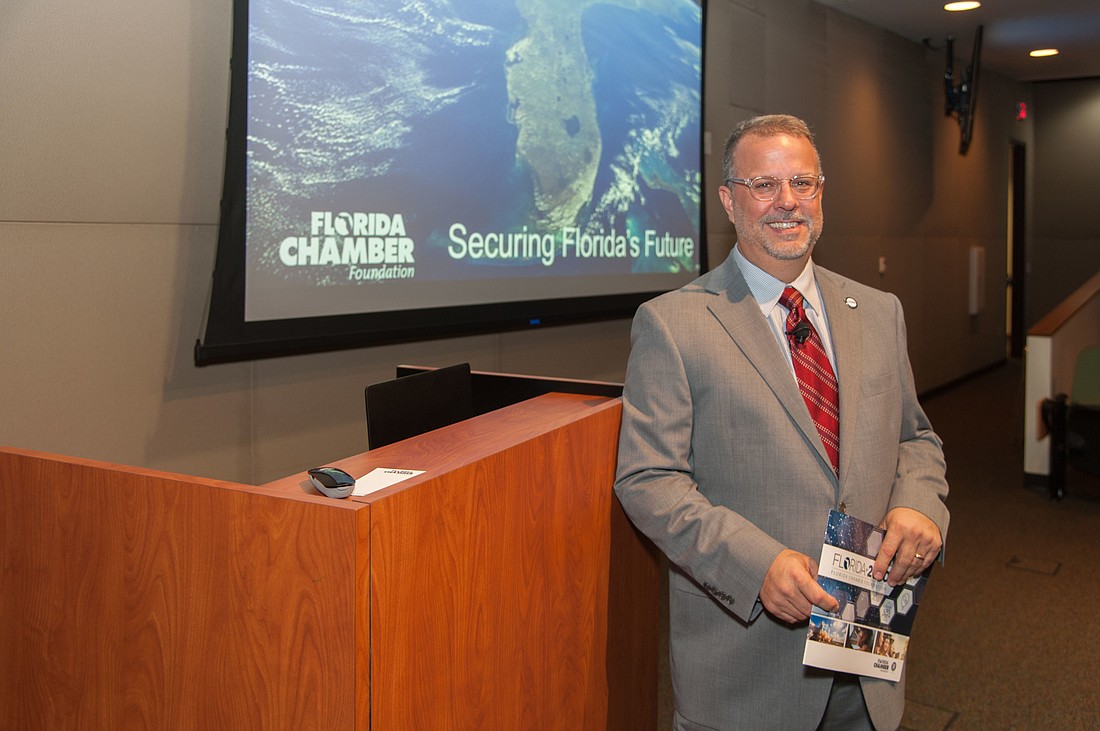There was a time when some people thought the future would bring jet packs and undersea cities.
While not so fanciful, the Florida of the future was the subject of a three-year project dubbed Florida 2030.
Tony Carvajal with the Florida Chamber Foundation, the organization heading up the project, has been taking the recently released project results on tour statewide, meeting with business and civic groups. That includes a stop earlier this fall in Bradenton.
“I think that we really have the fighting chance to not just be a leader in the U.S. but a global leader.” — Tony Carvajal, executive vice president, Florida Chamber Foundation
The Florida Chamber Foundation conducted town halls in every county in the state for the project. More than 10,000 people participated in the town halls and planning sessions, says Carvajal, executive vice president of the foundation. The list includes community members, planning councils, city commissions, county commissions and chambers of commerce. The Foundation will continue to share the findings over the next year.
A full report — with detailed information about trends and targets for the state — can be found at Florida2030.org. “The end result is not a state plan,” Carvajal says. Instead, the intent was to create a blueprint for communities to use to develop their own plans. He says, “We can only do so much out of Tallahassee, and usually it’s a hell of a lot less than you can do in your community.”
In an interview with the Business Observer, Carvajal shared his thoughts on growth ahead for Florida, what makes the west coast of the state stand out and pending opportunities. Edited excerpts:
- Goal-oriented: Florida 2030 has some big goals. Carvajal says the list includes Florida becoming the 10th largest economy in the world, by building talent and infrastructure and by diversifying the economy. (The state is currently the No. 17 ranked economy in the world.) Another key goal, Carvajal says, is to ensure paths to prosperity for every zip code in Florida.
- Nurture nature: The Tampa to Naples region has certain advantages, he says. “One of the things Southwest Florida has going for it, and one of the things you have to be worried about is the beautiful coast and access to the Americas,” Carvajal says, adding that the area should leverage the natural beauty.
- Launch pad: Another plus for the region? Carvajal says Southwest Florida is often known for its services, but it’s not just about hospitality. “Folks that move into that region bring national and international expertise,” he says. “It’s often a great launching place for people who consult in the Americas as well as around the globe.”
- Corridor calls: One of the fastest growing parts of Florida, reports Carvajal, is the Interstate-4 corridor. Tampa to Naples’ proximity to the corridor will have a positive impact on growth, he says.
- Talent pool: In the years between now and 2030, a big priority will be to build a workforce that can keep up with the state’s growth. “Your region is attracting some of the young talent from out West,” Carvajal says, including young professionals from tech hot spots such as Silicon Valley. “Some if it is the innovation industries," he says, "and some of it is the technology and education in the region.”
- Worker wise: Addressing the same challenge, Carvajal says low unemployment rates could contribute to workforce issues. There’s a real challenge potentially for people to find talent, he says. “You’re not going to solve the problem with just the folks there.” The area, he says, will have to bring people from elsewhere to meet the need.
- Strain situation: Amid all the talk of growth, Carvajal points out that while growth can create opportunities, it can also potentially put pressure on resources, such as roads, housing and health care. “It strains amenities you have in the region,” he says. “If you’re not paying attention to that growth…we could be running into some conflict that starts compromising quality of life.” One aspect of life where he says the state is already seeing that? Affordable housing. Carvajal says, “That’s a big crisis.”
- Clear way: To help encourage business growth, communities can clear the path so they’re not standing in the way of business and opportunities, Carvajal says. That means communities can consider the question, “‘Are you making it easier for an entrepreneur to do what they do best?’”
- Sunny days: In the years ahead, Florida should encourage entrepreneurism, he says. “I think that we really have the fighting chance to not just be a leader in the U.S. but a global leader,” Carvajal says. “I’m a firm believer in the power of free enterprise as a force for good.”

